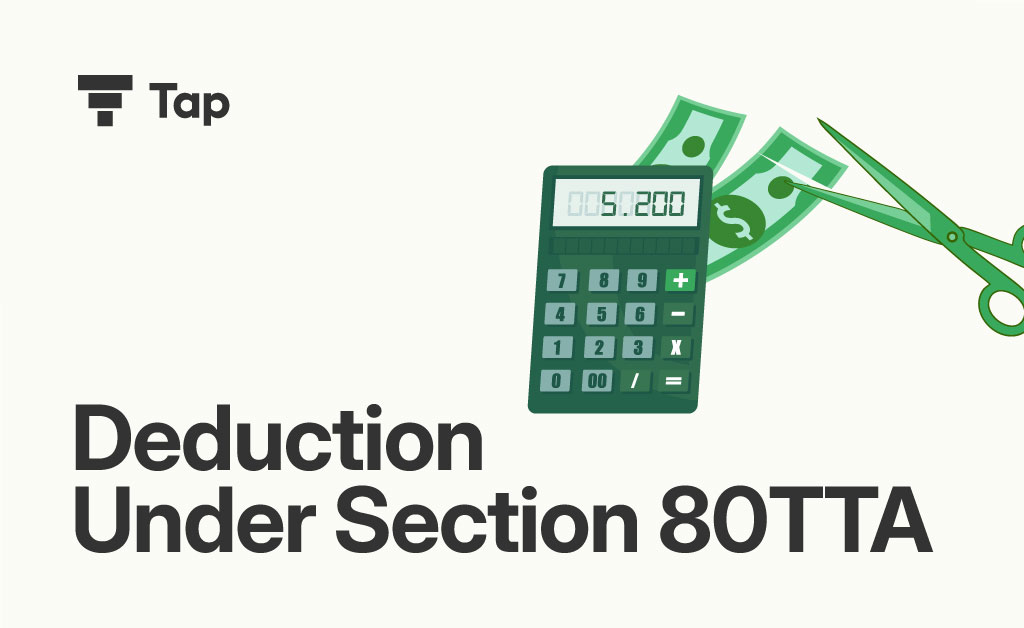Section 80TTA Explained: Tax Benefits on Savings Account Interest

Tax deductions are crucial in helping taxpayers reduce their taxable income, thereby lowering the overall tax burden. One such valuable provision in the Income Tax Act 1961 is Section 80TTA. This section offers deductions on interest income earned from savings accounts, promoting savings among taxpayers. This article delves into the details of Section 80TTA, its benefits, eligibility, and comparison with Section 80TTB, ensuring you maximise your tax savings.
What is Section 80TTA?
Section 80TTA of the Income Tax Act, 1961, deducts interest income from savings accounts. This Deduction is available to individual taxpayers and Hindu Undivided Families (HUFs). The primary aim of this section is to encourage savings by offering tax benefits on the interest earned from savings accounts.
Eligibility for 80TTA Deduction:
The 80TTA Deduction is available to:
- Individual taxpayers (below 60 years of age)
- Hindu Undivided Families (HUFs)
It’s important to note that senior citizens (aged 60 and above) are not eligible for the 80TTA Deduction, as there is a separate provision under Section 80TTB.
Types of Accounts Eligible Under Section 80TTA:
The following types of savings accounts are eligible for the 80TTA Deduction:
- Savings accounts with banks
- Savings accounts with post offices
- Savings accounts with cooperative societies engaged in banking business
80TTA Deduction Limit:
The maximum Deduction allowed under Section 80TTA is ₹10,000 per financial year. If the total interest earned from all eligible savings accounts is less than ₹10,000, the actual interest amount is considered for Deduction. If the total interest exceeds ₹10,000, the maximum Deduction is limited to ₹10,000.
Example Calculation:
Let’s consider an example to understand the deduction limit better:
- Total interest earned from savings accounts in a financial year: ₹12,000
- Deduction allowed under Section 80TTA: ₹10,000 (maximum limit)
- Taxable interest income: ₹12,000 – ₹10,000 = ₹2,000
In this example, the taxpayer can claim a deduction of ₹10,000 under Section 80TTA, and the remaining ₹2,000 will be considered as taxable income.
Exclusions Under Section 80TTA:
Interest earned on fixed deposits, recurring deposits, and any other time deposits do not qualify for the Deduction under Section 80TTA. This section exclusively applies to interest earned from savings accounts.
How to Claim 80TTA Deduction:
To claim the 80TTA Deduction, taxpayers need to follow these steps:
- Include Interest Income: Include the total interest income earned from eligible savings accounts under “Income from Other Sources” in your income tax return.
- Claim Deduction: When filing the income tax return, you can claim the Deduction under Section 80TTA up to a maximum limit of ₹10,000.
- Maintain Records: For verification purposes, keep records of the interest earned from savings accounts and the total amount claimed as a deduction.
Section 80TTA vs. Section 80TTB
Section 80TTA:
- Applicable to individual taxpayers below 60 years and HUFs.
- Provides a maximum deduction of ₹10,000 on interest earned from savings accounts.
- Excludes interest earned from fixed deposits, recurring deposits, and other time deposits.
Section 80TTB:
- Applicable to senior citizens (aged 60 and above).
- Provides a maximum deduction of ₹50,000 on interest earned from savings accounts, fixed deposits, and recurring deposits.
- Offers higher deduction limits to cater to the financial needs of senior citizens.
Importance of Section 80TTA in Tax Planning:
Section 80TTA plays a vital role in tax planning by allowing individual taxpayers and HUFs to reduce taxable income. Taxpayers can lower their overall tax liability by claiming the Deduction under this section and encouraging economic savings. Knowing the provisions and limits under Section 80TTA is essential to maximising the available tax benefits.
FAQs About Section 80TTA:
- What is Section 80TTA of the Income Tax Act?
Section 80TTA of the Income Tax Act, 1961, deducts interest income from savings accounts. This Deduction is available to individual taxpayers and Hindu Undivided Families (HUFs).
- What is the 80TTA deduction limit?
The maximum Deduction allowed under Section 80TTA is ₹10,000 per financial year. If the total interest earned from eligible savings accounts is less than ₹10,000, the actual interest amount is considered for Deduction.
- Can senior citizens claim the 80TTA Deduction?
No, senior citizens (aged 60 and above) cannot claim the 80TTA Deduction. They have a separate provision under Section 80TTB, which offers a higher deduction limit of ₹50,000 on interest income.
- What types of accounts are eligible for the 80TTA Deduction?
The 80TTA deduction applies to interest earned from savings accounts with banks, post offices, and cooperative societies engaged in banking.
- How to claim the 80TTA Deduction?
To claim the 80TTA Deduction, include the total interest income earned from eligible savings accounts under “Income from Other Sources” in your income tax return and claim the Deduction up to ₹10,000.
Conclusion:
Section 80TTA of the Income Tax Act is a valuable provision that offers deductions on interest income earned from savings accounts. By understanding the eligibility criteria, deduction limits, and how to claim the Deduction, taxpayers can effectively reduce their taxable income and promote savings. While Section 80TTA is designed for individuals below 60 years and HUFs, senior citizens benefit from Section 80TTB, which provides higher deduction limits. Incorporating these deductions into your tax planning strategy can significantly affect your financial health and liability.
Fixed-income investments, such as bonds Issued by government agencies like NHAI, REC, PFC, and HUDCO, can be exempt from income tax. Where can you invest in fixed-income investments? TapInvest is the best solution for your answer, we provide multiple investment opportunities; sign up today and explore.
